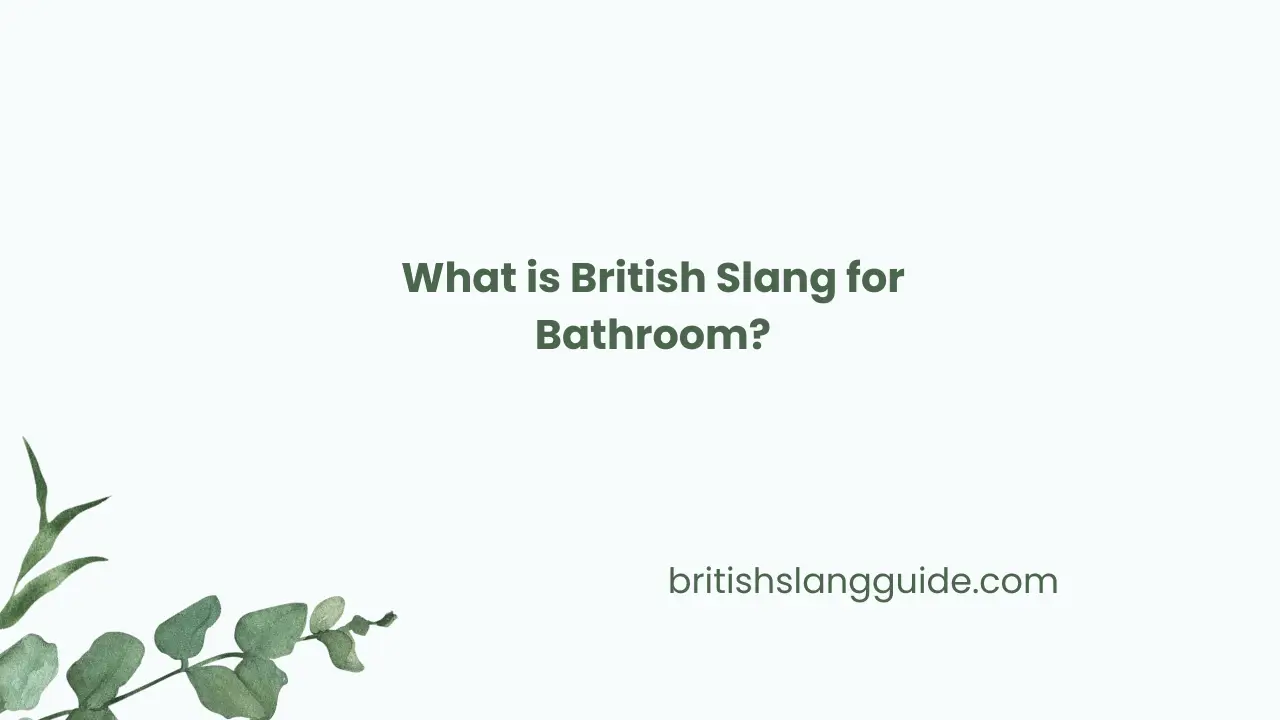Did you know that Britian or UK people use different words for Bathroom? Yes, you heard it right; they often use words like “Loo” instead of Bathroom. Not only this but they have some other words too to call the restroom and simply understanding these words can help you better enjoy British culture and smooth up your vacation.
This article will go over the British slang for Bathroom, their background, and why understanding these terms could be helpful.
What is the British Slang Word for Toilet in Urban Dictionary?
The most often used word for the bathroom in British English is “the loo.” Whether you’re at a posh restaurant or a friend’s house, you will hear this courteous approach of saying toilet utilised everywhere.
For Instance: You may say, “I’m off to the loo,” or “Where’s the loo?”
But in the UK, “loo” is not the single slang term used for the restroom. Here are a few other terms:
- The Bog: This is a casual and sometimes cheeky way of referring to the toilet. You’ll hear this mostly among friends in informal settings. It’s a bit rude, but very common in British humour. For example, someone might say, “I need to use the bog.”
- The Lav: Short for lavatory, this term is older and a bit more formal. While not as commonly used as “loo,” you might still hear it in politer or older circles. Though it sounds courteous, today it is quite old-fashioned.
Mostly found on signage, particularly in older buildings or hotels, the WC stands for “Water Closet.” Although it’s unusual to hear someone mention “WC” in conversation, if you come across a sign stating it, now you know it denotes bathroom!
What is a Restroom Called in England?
If you are American, you are accustomed to requesting the “restroom” in public. In the UK, nevertheless, the word “restroom” is not usually used. They instead say “loo,” or “toilet.” To help prevent misunderstandings, ask “Where’s the loo?” instead of “Where’s the restroom?” if you are at a café or restaurant in England.
In England, the word “bathroom” is used very differently also. In dwellings, it describes a room with a shower or bath. Therefore, people may assume you are seeking for somewhere to take a bath if you request the restroom in public!
Fun Fact: Why Do We Call It a “Loo”?
The precise source of the term “loo” is a bit of a riddle!
Popular wisdom is that the British slang for Bathroom is originated from the French phrase “gardez l’eau,” which means “watch out for the water.” People would pour their chamber pots—used for toilet access—out of the window onto the street below in the ancient days before indoor plumbing. Shouting “Gardez l’eau!” as a warning to anybody strolling by, they With time, “l’eau”—French for water—could have changed to become “loo.”
Another interesting idea is that “loo” originated from the ancient British habit of referring to toilets by number; “loo” is short for ” Room 100″ in some public buildings.
The History of British Bathroom Slang
The British Bathroom’s History Slang names for the restrooms in Britain have roots for hundreds of years. People used chamber pots or privies inside their homes before indoor toilets became standard. In the 17th and 18th centuries, the word “privy” was a frequent phrase used to describe a secluded area to excite oneself.
The term “Water Closet” (WC) was first used to characterize a tiny chamber with a toilet and flowing water as indoor plumbing proliferated during the 19th century. At the time, this was seen as contemporary and sanitary; the word stuck—though now it is usually utilized on signage.
From the Latin phrase “lavare,” meaning “to wash,” the term “lavatory” Considered more courteous than saying “toilet,” this word gained popularity in Victorian Britain. Although still used today, “lavatory” is more formal than “loo.”
Different Terms in Different Parts of the UK
The UK is small, but its different regions have their own slang for the bathroom. For example:
For toilet in Scotland, you may hear the phrase “cludgie”. Though some Scots still use it now, it is far more traditional.
From Irish slang, some still refer to the toilet in Ireland (including Northern Ireland) as “jacks.”
Although “loo” is the most often used word in the UK, if you are visiting particular areas of the nation, these slang words for toilet are interesting to understand!
In the US, people use:
- Bathroom (for homes and public places, even if there’s no bath)
- Restroom (especially in public places like malls or restaurants)
- Washroom (more common in Canada)
In the UK, people use:
- Loo (the most common word for the bathroom)
- Toilet (a direct term, but widely accepted in everyday conversation)
- Lavatory (more formal, used in certain places like hotels)
- WC (seen mostly on signs in public places)
- Men or Women (used to name public bathrooms for men’s and women’s usage)
Fun Fact: The British don’t use “bathroom” unless there is an actual bath involved, hence an American asking for the bathroom at a British bar could get a perplexed look.
British Bathroom Etiquette: Advice
Knowing some fundamental restroom etiquette can help you not feel awkward if you are visiting the UK. Here are some suggestions:
How would one ask for the bathroom? Say, gently, “Excuse me, where’s the loo?” Alternatively “Can you point me to the toilet?”
Public toilets: To use the bathroom in certain public facilities, particularly parks or train stations, you might have to pay a little charge usually between 20 and 50 cents. Just in case, be sure you have some coins.
In Britain, queuing that is, standing in line is somewhat ingrained in the society. Should a restroom queue exist, be sure to wait your turn and exercise patience.
Fun Fact: The British are renowned for their courteous queuing for practically everything, even the toilet. Actually, cutting in line that is, skipping the queue is seen as rather disrespectful.
How do things stand with public toilets in the United Kingdom?
Many areas of the UK, particularly in large towns, parks, and rail stations, have public restrooms. Still, you will often discover that these bathrooms are not free. To use a public toilet, you might have to pay a little fee usually between twenty and fifty cents. This especially holds true in big cities like London.
Public restrooms may be quite antiquated in certain areas while others are kept well-maintaining. Many cities have worked recently to update public toilets with improved hygienic standards and accessibility.
Knowing what words like “loo,” “bog,” “lav,” and “WC” mean can help you feel far more competent with the British toilet language. Whether you’re at a fancy restaurant or a small bar, you’ll know just what to say when the natural world calls. Knowing these tiny variations between British and American English can help you blend right in and smooth up your trips.
Remember not to ask for the “bathroom”—just say “Where’s the loo?” next time you are in Britain.





